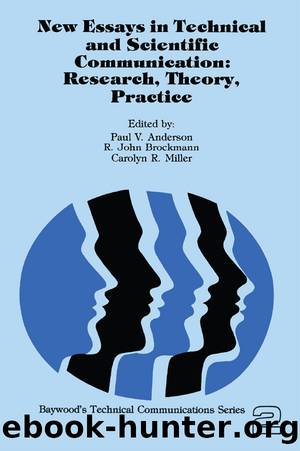New Essays in Technical and Scientific Communication by Anderson Paul V.;Brockman John R.;Miller Carolyn R.;

Author:Anderson, Paul V.;Brockman, John R.;Miller, Carolyn R.;
Language: eng
Format: epub
Publisher: Taylor & Francis Group
Published: 2019-08-15T00:00:00+00:00
CHAPTER 8
A Theoretical Perspective On âHow Toâ Discourse
ELIZABETH HARRIS
âHow toâ discourse is fundamentally important. By âhow toâ discourse, I mean whole pieces of writing that exist to instruct their readers in the performance of some physical or intellectual task. Although titles do not always distinguish the kinds of writing I am talking about from simply informative discourse, âhow toâ discourse appears under titles such as: Architectural Graphic Standards; Crude Oil Tanks; DEC-10 Userâs Pocket Reference List; How to Get Good Medical Care; How to Make American Historical Costumes; How to Prepare Your 1980 Income Tax Return; âHow to Use Your Kodak Instamatic X-35F Cameraâ; Learning to Look; Metalsmithing; Modern Carpentry; The Organic Way to Plant Protection; Service Manual, Volvo 164, 1970; Understanding Poetry; and Writing a Technical Paper. From aesthetic and scholarly perspectives, such writing may seem dull and humble, its interest residing in what it is âabout,â rather than what it is. It is not literary art. Though it may be exceedingly artful and in certain respects beautiful, it does not exist for those purposes. It is work with words, not play. Sometimes, especially when such writing is about intellectual tasks, it may be the instrument of new discovery. More often it conserves and disseminates knowledge, rather than extending it in any absolute sense. âHow toâ writing, as my list of titles suggests, is not specific to high technology, bureaucracy, or consumer society, although it has important applications for all of these. The kind of writing I am talking about, however, instructs much of Western society in the performance of basic tasks. In literate cultures where many people perform tasks besides the ones their parents performed, âhow toâ writing has replaced oral traditions about how to plant potatoes, stanch bleeding, and drive mules. It has also manifested and promoted the rationalization and democratization of Western cultures. Such writing exposes customary practice to reasoned criticism and opens new areas of experience to literate people. The importance of this kind of writing invites and justifies our asking what, exactly, it is. What generalizations can we make about it, as language in relation to other language?
Download
This site does not store any files on its server. We only index and link to content provided by other sites. Please contact the content providers to delete copyright contents if any and email us, we'll remove relevant links or contents immediately.
Unwinding Anxiety by Judson Brewer(72994)
The Art of Coaching by Elena Aguilar(53191)
The Fast Metabolism Diet Cookbook by Haylie Pomroy(21131)
Rewire Your Anxious Brain by Catherine M. Pittman(18643)
Healthy Aging For Dummies by Brent Agin & Sharon Perkins RN(17038)
Talking to Strangers by Malcolm Gladwell(13347)
The Art of Thinking Clearly by Rolf Dobelli(10454)
Mindhunter: Inside the FBI's Elite Serial Crime Unit by John E. Douglas & Mark Olshaker(9324)
Crazy Rich Asians by Kevin Kwan(9277)
The Compound Effect by Darren Hardy(8948)
Tools of Titans by Timothy Ferriss(8365)
Periodization Training for Sports by Tudor Bompa(8254)
Becoming Supernatural by Dr. Joe Dispenza(8201)
Wonder by R. J. Palacio(8097)
Crystal Healing for Women by Mariah K. Lyons(7928)
Bodyweight Strength Training by Jay Cardiello(7908)
Change Your Questions, Change Your Life by Marilee Adams(7759)
Therapeutic Modalities for Musculoskeletal Injuries, 4E by Craig R. Denegar & Ethan Saliba & Susan Saliba(7711)
Nudge - Improving Decisions about Health, Wealth, and Happiness by Thaler Sunstein(7692)
